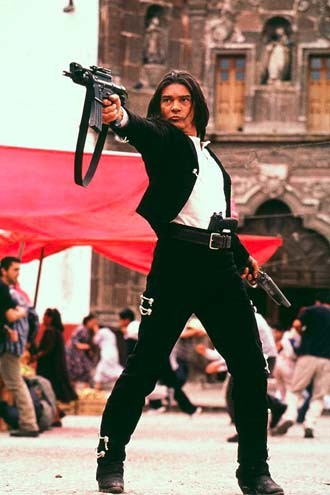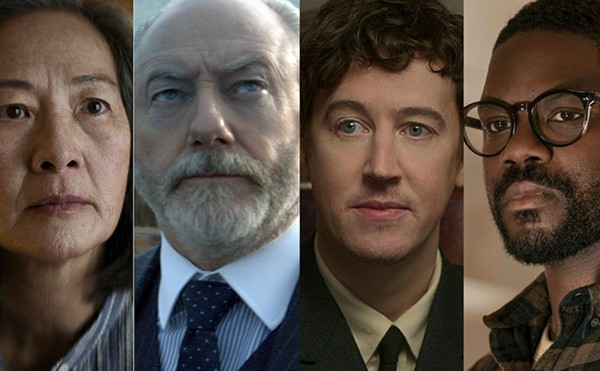| Antonio Banderas returns as El Mariachi in Once Upon a Time in Mexico. Courtesy photo |
Robert, take a break. You've earned it.
You hold the distinction of being the most commercially successful Mexican-American director in the history of cinema - and the only Chicano to helm two separate trilogies. That says a lot, although I'm not sure if you are comfortable having to shoulder that extra burden, because it means that people like me (as a critic and a fan) expect a lot from you.
Besides, it seems like you've been working nonstop for the past three years, since Spy Kids became a big success and spawned two sequels. Sure, I know that you filmed Once Upon a Time in Mexico in 2001, but the powers-that-be kept on pushing back the release date.
I'm more than willing to overlook the rough edges in 1992's El Mariachi, your ultra-low budget and absolutely brilliant debut film, only because your energy, stylistic nuances, and rasquache can-do more than make up for what could have been just another straight-to-video entry in the genre. Besides a lot of heart and soul, El Mariachi (as with the first Spy Kids) was cleverly subversive; there is obviously more going on than meets the eye. You have said before that you didn't want to hit people over the head with your message, and clearly, no one can accuse you of being preachy or didactic in your films.
El Mariachi ended with the hero losing his hand, his girl, and his guitar. Desperado, 1995's followup, loosely continued the saga of the Mariachi, now played by Antonio Banderas, tracking down the man responsible for the tragic turn of events in his life. A bigger budget meant more guns, more explosions, more action; you also upped the hipster ante (best exemplified by the annoying presence of Quentin Tarantino) but killed off some of the coolest characters, good or bad, along the way.
That's all right, because they come back in spirit or in person in Once Upon a Time in Mexico, the third (and presumably final) chapter in the Mariachi series.
El Mariachi and Carolina (Hayek), his love interest from the end of Desperado, marry and have a daughter; both are murdered by General Marquez, a corrupt military commander in the employ of drug lord Barillo (Dafoe). Johnny Depps' Agent Sands, a CIA operative more Hunter S. Thompson than 21 Jump Street, recruits El Mariachi to kill Marquez - but only after Marquez has overthrown the populist president (screen great Pedro Armendáriz).
All this serves to boost the epic scope of the film - at least the potential for it, since, unfortunately, you fall short of delivering on the promise. Even your trademark cinematic flourishes seem reined in. (Incidentally, the digital camerawork looks great.)
I want more of Carolina's knife-wielding exploits - beyond the too-brief flashbacks in which she appears. As before, you introduce such a wide array of intriguing characters like fellow mariachi gunslingers Lorenzo and Fideo - each of whom has a far more interesting story than we see here. Rather than expand on any of this, Depps' Agent Sands dominates - pushing even the iconic Mariachi to the sides.
| ONCE UPON A TIME IN MEXICO Dir. & writ. Robert Rodriguez; feat. Antonio Banderas, Salma Hayek, Johnny Depp, Mickey Rourke, Eva Mendes, Danny Trejo, Enrique Iglesias, Marco Leonardi, Cheech Marin, Rubén Blades, Willem Dafoe, Pedro Armendáriz Jr. (R) |
Depp will get a lot of praise for his eccentric, scene-chewing portrayal of Sands; for me, his character is the biggest liability in what could have otherwise been a solid, enjoyable genre film - not your best, but certainly not your worst. Obviously, Sands isn't a cool dude, but you make him out to be one, in spite of himself. With El Mariachi, you respected your audiences' intelligence enough to let them recognize your running critique of globalization. (There is no need for musicians when an entire grupo can be replaced by one man with a keyboard.) Here you spell it out, in excess, which makes me question Sands' effectiveness in exposing the problems with cultural tourism or the CIA's role in overthrowing foreign governments ("I set them up, I watch them fall," he says), if that in fact was your intent. But this isn't your message film, this is your action-adventure epic, so I'll leave it at that.
Once Upon a Time in Mexico's climax coincides with the Dia de los Muertos celebration, where the sons of Mexico (as uttered by a Spaniard, without a hint of irony) unite to defend the patria. (Too bad there is little room for the daughters of Mexico - although a modern-day adelita does make a crowd-pleasing appearance.) As appealing as it is to my sense of cultural pride, ultimately I'm left wondering if it is entertainment as empowerment - or exploitation? •
















